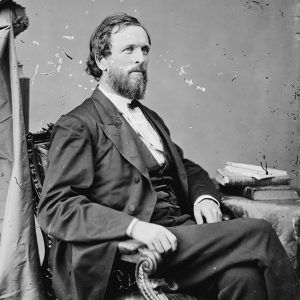calsfoundation@cals.org
Benjamin Franklin Rice (1828–1905)
Benjamin Franklin Rice was a Reconstruction-era U.S. senator from Arkansas, as well as an attorney, politician, and businessman who helped to reestablish the state following the turmoil of the Civil War. His career as senator was bookended by his involvement in the trial of David O. Dodd and the Brooks-Baxter War.
Benjamin Rice was born on May 26, 1828, in East Otto, New York, to Elijah Rice and Hannah Hanks Rice; he was one of four sons, all of whom became lawyers. After attending private schools and studying law, Rice was admitted to the bar. He then moved to Irvine, Kentucky, where he practiced law for several years and also became involved in politics. He served as a member of the state House of Representatives in 1855 and 1856 and also as a presidential elector for the Republican Party in 1856. On February 16, 1858, he married Nancy Riddell of Kentucky. They had two daughters, Laura and Fanny, and a son, Benjamin.
In 1860, Rice and his family moved to Minnesota. At the outbreak of the Civil War, Rice volunteered for service and joined the Third Minnesota Volunteer Infantry. Enlisted as a private, he was later promoted to captain and also served as the unit’s judge advocate. His unit saw action at Louisville, Kentucky; Nashville, Tennessee; and Murfreesboro, Tennessee. He was captured by Confederate forces and paroled back to Minnesota after the Murfreesboro battle. After engaging Indian forces west of Minnesota, the unit was sent south to Arkansas in 1863, and Rice was among the Union officers who arrived in Little Rock (Pulaski County) on September 10, 1863. As judge advocate, Rice presided at the espionage trial of David O. Dodd, who was convicted and was hanged near the Little Rock Arsenal at St. Johns’ College on January 8, 1864. Rice apparently remained in Little Rock for the duration of the war, opening the law office of Rice, Benjamin and Ratcliffe even before the end of the war. Early in 1866, he also opened a law office in Pine Bluff (Jefferson County).
A staunch Republican, Rice helped to establish the new state government and was named chairman of the committee that prepared a code of practice for the lawyers of Arkansas in 1868. The state legislature chose him to serve as U.S. senator in a term running from June 23, 1868, to March 3, 1873. While in the Senate, he worked for the eventual statehood of Oklahoma, offering in March 1870 a proposal that would end self-rule for the five tribes in what was then called the Indian Territory. (His motion was tabled.) During the final two years of his term in the Senate, Rice was chairman of the Senate Committee on Mines and Mining. As a lame duck senator after the elections of 1872, Rice called for an investigation of the gubernatorial election of Arkansas in which Elisha Baxter narrowly defeated Joseph Brooks. The federal investigation that followed failed to overturn the election results.
Also in 1872, Rice closely allied himself with the so-called Brindletail faction of Arkansas’s Republican Party, which was led by Brooks. On May 22, this group met in Little Rock and endorsed Democrat Horace Greeley for president rather than the incumbent Republican president Ulysses S. Grant. This action earned the hostility of Little Rock newspapers, including the Arkansas Gazette, which proceeded to accuse Rice of financial improprieties dating back to his years in Kentucky up to the current time. On September 18, 1872, Rice and several partners purchased control of the Cairo and Fulton Railroad, and the press pursued him relentlessly, frequently asserting that Rice diverted money from his clients and businesses to pay gambling debts. Marginalized from party politics by Baxter and by Powell Clayton, Rice appears not to have taken an active role in the later violent stages of the Brooks-Baxter War, in spite of his earlier involvement in the Brindletail cause.
Rice and his family moved to Colorado in 1875, where he opened a law practice in Leadville while living in Denver. Later, Rice lived in Washington DC and in New Mexico, where he continued to practice law until his death. He died on January 19, 1905, in Tulsa, Oklahoma, and is buried in Oak Hill Cemetery in Washington DC.
For additional information:
“Benjamin Franklin Rice.” Biographical Dictionary of the United States Congress. http://bioguide.congress.gov/scripts/biodisplay.pl?index=R000195 (accessed March 14, 2022).
Fischer, LeRoy H. “David O. Dodd: Folk Hero of Confederate Arkansas.” Arkansas Historical Quarterly 37 (Summer 1978): 130–146.
Woodward, Earl F. “The Brooks and Baxter War in Arkansas, 1872–1874.” Arkansas Historical Quarterly 30 (Winter 1971): 315–336.
Steven Teske
Encyclopedia of Arkansas History & Culture







Comments
No comments on this entry yet.